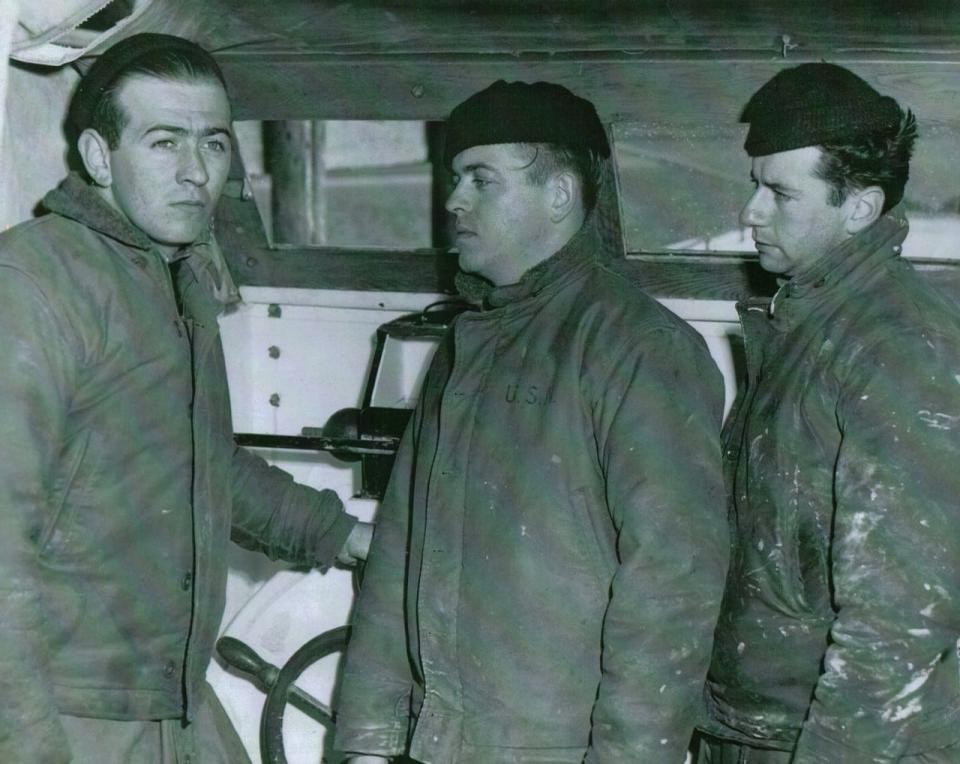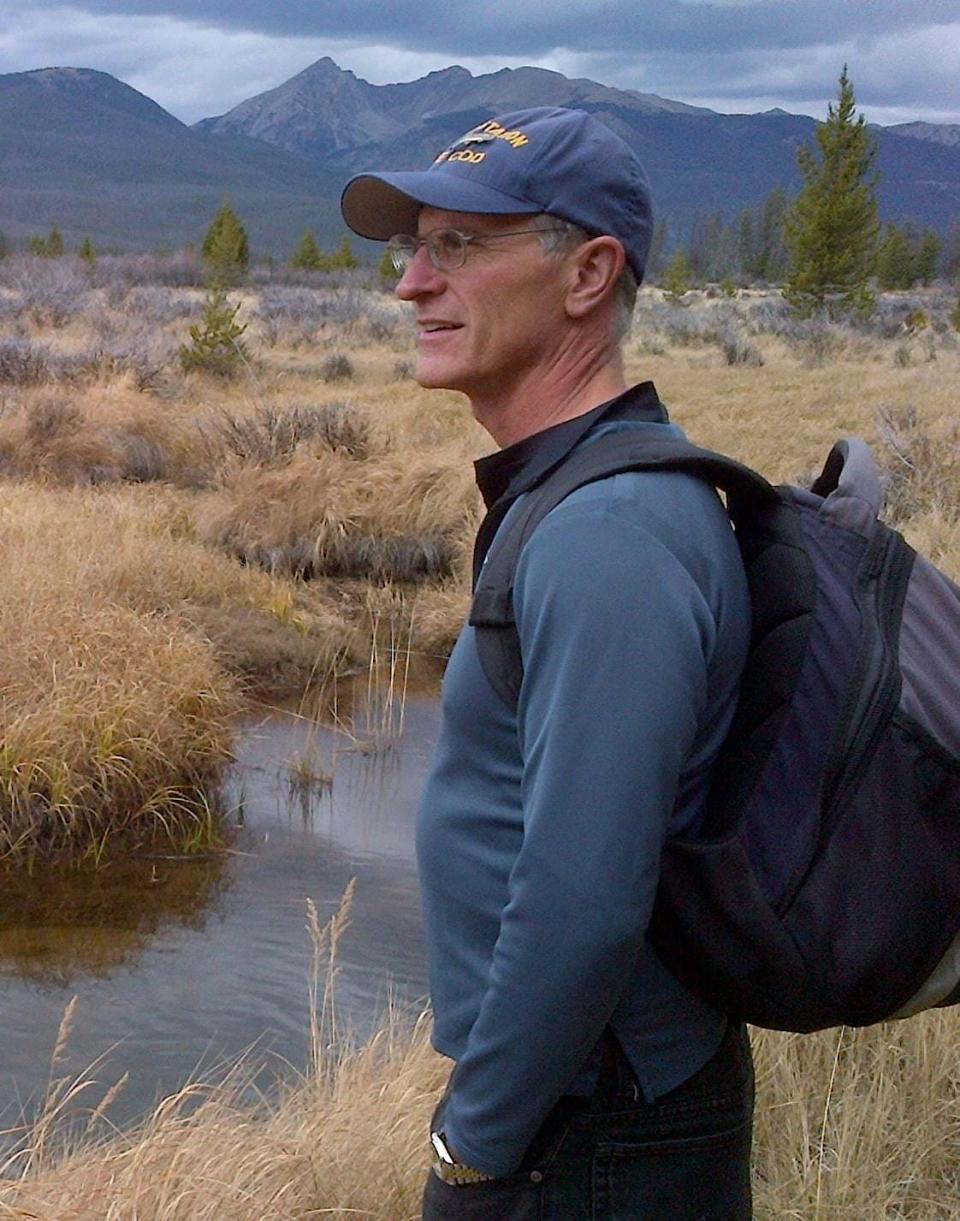'The Finest Hours' author wants you to know about the heroic Coast Guard rescues of 1952.
- Oops!Something went wrong.Please try again later.
FAIRHAVEN — The date was Feb. 18, 1952. The SouthCoast was contending with a "blinding blizzard which left 8½ inches of snow and crippled transportation," according to the following day's issue of The Standard-Times.
"Hundreds of autos remained marooned in deep snow and drifts and highways were packed down with a hard coating of snow and ice, making driving hazardous," the article reads.
Meanwhile, few were yet aware that relatively nearby, there were 84 men at sea fighting for their lives, in what an abutting article from the Feb. 19, 1952 Standard-Times called "Cape Cod's most serious maritime disaster since World War II."
That morning, an oil tanker — the Pendleton, reportedly carrying 41 men — split in two off of Cape Cod; and about 27 miles from there, another oil tanker — the Fort Mercer, with its 43 men — was sharing the same fate.
In the end, a total of 70 were rescued by the Coast Guard from both wrecks, and 14 died, according to Michael Tougias, co-author of the book "The Finest Hours: The True Story of the U.S. Coast Guard's Most Daring Sea Rescue," released in 2009 and later adapted by Disney into a 2016 full-length feature film of the same title.
While the rescues at both sites were highly commended, the more condensed action of the Pendleton rescues — taking place over a matter of hours as opposed to days for the Fort Mercer — ultimately took the spotlight, along with the team of four brave rescuers who took extraordinary means to save what men they could using a 36-foot motorized lifeboat.
"They had some close calls," Tougias said of the rescuers' journey over the particularly challenging Chatham Bar, with its surrounding area nicknamed "the graveyard of the Atlantic." "It's a shallow area where these big rollers come in and they explode when they break. So you have big 35-foot waves breaking on this thing that's only 36-feet."
See the latest: DOJ settlement agreement: New Bedford schools must better address K'iche' speakers' needs
Among the four rescuers was Richard Livesey of Fairhaven, a 22-year-old Coast Guard seaman stationed in Chatham. As Tougias describes in "The Finest Hours," Livesey — who had volunteered to go out on the rescue that day — "seemed to have salt water coursing through his veins."

"His father had been in the Navy for more than 20 years and Richard wanted to continue the seaman tradition," Tougias said.
According to The Standard-Times' Feb. 19, 1952 article, a 38-year-old New Bedford man named Samuel Barboza, of 28 Hillman St., was among those aboard the Fort Mercer at the time of the incident. While the article is unclear on whether he was among those rescued, an obituary record available online of his wife, Palmira Barboza — who is named in the article — notes that he died in 1987.
From faded glory to vibrant inspiration
While the Pendleton and Fort Mercer rescues received an abundance of public attention at the time and continued to produce follow-up headlines over the next few years, according to Tougias, the story would eventually fade from public consciousness.
In fact, if it wasn't for Tougias' deep dive into old records and reports, he himself wouldn't have been aware of the events, which took place a few years prior to his birth. Having already written several books on real-life survival and rescue events, he was in research mode looking for his next book subject when he came across some documentation from that day.
"I saw a Coast Guard casualty report on it and I realized, well that’s probably the greatest rescue in Coast Guard history and it happened right here on Cape Cod," he said. "Of course back then there was no internet, so I checked with every library and there was no book about it."

With that discovery in-hand, Tougias got to work with co-author Casey Sherman on "The Finest Hours," continuing to scour the archives and tracking down key sources. Richard Livesey was one of surviving rescuers Tougias was able to reach.
"Richard was living down in Florida at the time and I remember him saying, wow, no one's asked me about that in a while," Tougias said of the time he traveled to Livesey's home to interview him around 2002. "There was a whole bunch of interest when it initially happened. They were on the frontpage of newspapers across the country, but after it died down, he hadn't talked about it very much."
Get inspired: Designer Aidil Timas Grogan at work in New Bedford
A loyal friend
During their talk, Tougias says Livesey opened up about how choosing to take part in the rescue was largely motivated by his loyalty to his close friend and Coast Guard comrade Bernie Webber, a 24-year-old boatswain's mate who led the team that day. "I remember him (Livesey) saying he felt an obligation to Bernie," Tougias said. "He couldn't imagine letting his friend go out possibly with somebody who wasn't as qualified. He had been stationed there a while so he thought, I gotta do this for Bernie."
Rebels and shipwrecked souls rest here: The ocean had other ideas, though.
Unfortunately, Tougias said, Livesy — who died in 2007 — would not live to see the finished product, with "Finest Hours" being released in 2009. However, Tougias says he feels fortunate for the chance to meet those he was able to before they passed, and also to connect with some family members of rescuers on a few occasions, including in 2016 at the Hollywood premiere of the film adaptation, starring Chris Pine, Casey Affleck, Ben Foster and Eric Bana as the four crew members.

Another opportunity that brought many survivors' family members together in one place happened several years earlier at the funeral for Webber, who died in 2009 around the time "The Finest Hours" was released.
In his talks with Webber — who Tougias says took on an especially active role in the book's development as a fact-checker — the rescue team leader shared that his friend Livesey's willingness to put himself on the line saved him from being put in a difficult position as a young leader.
"He (Webber) said, I was lucky Richard volunteered because I didn't want to choose anybody; I thought it was a suicide mission and whoever I chose was not going to be alive by the end of the night," Tougias recalled.
Take a look: This Cape Verdean native's designs are a hit at The Drawing Room in New Bedford.
According to a Cape Cod Times article, the last surviving Pendleton rescuer, Andy Fitzgerald, died in 2018 at age 86. He was 20 and serving as an engineer at the time of the rescue — the youngest member of the team. The other member was Seaman Ervin Maske, who was 23 at the time, and died in 2003 at age 74, according to U.S. Coast Guard Lightship Sailors Association International.
Secrets of being a hero
Tougias says the Pendleton rescuers, as well as others who've triumphed in similar situations, will be discussed in his next book, "Extreme Survival," which takes a look at a number of real-life periling survival/rescue situations, with a particular focus on the commonalities he's noticed between people who've been faced with seemingly impossible odds.
"In interviewing people who’ve been in these kinds of situations I started to see these patterns of what really good survivors and rescuers tend to have in common, techniques they used to get through these events, and how that could help all of us when we’re faced with adversity," Tougias said, noting he's looked into hundreds of such cases between direct interviews and research. "When I'm interviewing them, they never try to mask the fact that they were scared. And when I've asked, 'How do you manage that fear?' they'd say just think about your next task. Don't look too far down the road or it will overwhelm you.
"It's not about having no fear, it's about not being paralyzed by it, and still being able to think clearly and make good decisions despite that fear."
From the archives: Pendleton, Fort Mercer rescues of Feb. 18, 1952 by Matthew F. on Scribd
Tougias, who has authored 30 books for adults and eight for young adults, mentioned that the 1952 Coast Guard rescues haven't been the only SouthCoast connection he's come across when searching for writing topics, mentioning 2007's "Fatal Forecast: An Incredible True Tale of Disaster and Survival at Sea," about Westport man Grant Moore who, in November of 1980, went out in his own boat to save lobstermen caught in a storm.
Read the latest: Can this New Bedford local win 'Big Brother'? He made it to the final four — here's how
When Tougias delivers his presentation on "The Finest Hours" on Monday at Fairhaven Town Hall, he says he hopes his messaging about the true nature of heroism gets across as he takes the audience through the events of Feb. 18, 1952.
"I never just do an author talk — I take the viewer through the events visually," Tougias said about what attendees can expect. "I also want to talk about why Bernie felt like becoming America's hero at that time became a burden, which is one of those things that surprised me."
But if nothing else, Tougias says, as he takes people through his findings, he hopes he's able to provoke them to ask themselves: "What would I have done?"
If you go
WHAT: Author presentation, discussion and book signing for "The Finest Hours: The True Story of Heroic Sea Rescue" presented by the Friends of Millicent Library
WHEN: Monday, Sept. 26; Doors open at 6 p.m.
WHERE: Fairhaven Town Hall, 40 Center St.
This article originally appeared on Standard-Times: Author to discuss 1952 Coast Guard rescues with Fairhaven connection

